Have you ever been betrayed?
Surely you have. Every betrayal begins with surprise, followed by indignation, of the feeling of being used, It's a similar sensation to have been robbed,
The effects of treason aren't just practical. When you're betrayed, not only do you lose confidence in that person, you lose confidence in yourself and you capacity to judge other people's character, because you trusted in the betrayer and you didn't had the wits to tell he was one. You also lose confidence in the world that surrounds you. As a consequence of being double crossed you become more skeptical, you're less likely to deposit your trust in someone else, whomever that person might be. Which means that betrayal is an affront to the integrity of that whom is betrayed.
This episode isn't over until you find it within you to restore your inner order, to close that chapter, of feeling that you recovered your place. To do so, you need to claim revenge, retribution or to forgive the betrayer. Most people will recommend you to forgive. I don't forgive.
Dante Alighieri wrote that the Ninth Circle of Hell was reserved for betrayers. But if I ask you, "What is betrayal?", you won't be able to respond that easily.
Betrayal can easily be defined as a breach of trust.
You can betray your country, an idea, and the will of a dead person. None of them comprehends trust. Nor a dead man nor an idea is able to trust you. So how can you betray them? It has to be that betrayal isn't the act of violating trust, that's just the result of the series of actions that betrayal entails.
Trust is the break of compromise. If there's a written, verbal or tacit pact between a group of people, when one of them breaks that pact, we are in the presence of trust. This is a concrete idea. It describes the actions that the betrayer is performing and not the feelings of the one that's being betrayed. It's a good description but it can't explain the phenomena.
When a person betrays another one, they're breaking a pact, and this isn't a good enough definition either. We can betray a friend without having a pact with him, for example if we trash talk about him behind his back, and yet there's no broken pact.
A pact can also be broken without betrayal, let's say you don't pay your rent and leave the property before your contract is over. The landlord won't feel betrayed. He's likely to make you pay for compensation, but that's just it.
When a husband cheats on his wife, the reason she feels betrayed is because the man is in breach of the matrimonial contract. This is a mechanical way to look at things.
The problem with betrayal is deceit.
Deceit is betrayal, albeit betrayal and deceit often go hand in hand, it is possible to betray without deception. When Benedict Arnold switched sides, it made no difference if he did it out loud or between cloak-and-dagger. He's still considered a traitor.
Treason isn't easy to define.
Scholars agree that betrayal is easier to understand if we look at it from the perspective of literature.
Betrayal is a people problem and a subject to look upon by philosophers.
We can philosophically define betrayal, we can compare it, we can contrast it with several moral concepts, we can critically assess situations in which betrayal takes place.
What constitutes genuine betrayal or the perception of it?
Which are the guidelines to dissect it from other types of conduct?
Betrayal across literature and history

Judas receiving thirty pieces of silver for betraying Jesus, by Mattia Preti, c. 1640.
When Judas Iscariot betrayed Jesus Christ in exchange for 30 pieces of silver, he pointed out to the Romans who Jesus was by giving him a kiss on the cheek.
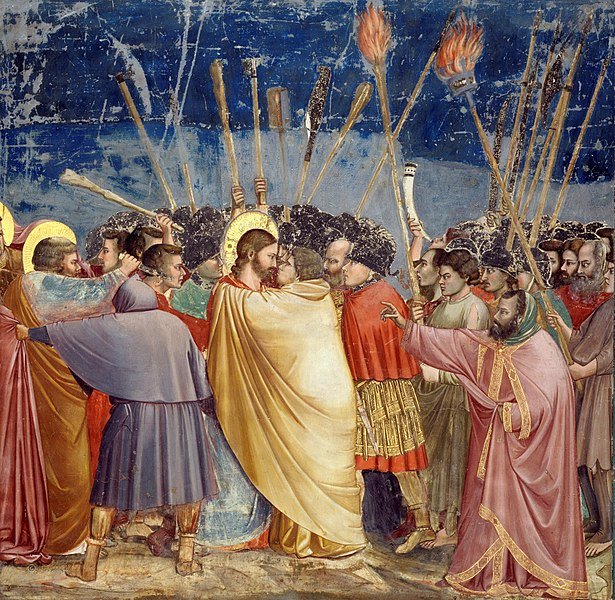
Kiss of Judas (1304-06), fresco by Giotto, Scrovegni Chapel, Padua, Italy.
The act of Judas kissing Jesus became synonymous with an act appearing to be an act of friendship, which is in fact harmful to the recipient.
After Jesus was crucified, dying a horrible, painful, slow death, Judas was overcome with remorse and tried to return the silver to the jews that gave them to him, but they wouldn't take it because they were blood money. So Judas Iscariot threw the coins on the ground and left, the jews, faithful to their nature picked them up and bought a piece of land.

Judas Returning the Thirty Silver Pieces, by Rembrandt van Rijn, 1629.
Judas Iscariot then committed suicide by hanging.
Delilah betrayed Samson in exchange for one hundred thousand pieces of silver. She sells the secret of Samson's strength to the Philistines and lets them inside his quarters to cut his hair while he sleeps.

Peter Paul Rubens' Samson and Delilah c. 1609
La Malinche was a Nahua woman from the Mexican gulf Coast who played a pivotal role in the Spanish Conquest of the Aztec Empire, acting as an advisor, interpreter and intermediary for Spanish Conquistador Hernán Cortés. She was a slave given to the Spaniards by the natives of Tabasco in 1519, and later she gave birth to Cortes' first son Martín.
For the Conquistadores, having a reliable interpreter was important for it gave them the key to rally the lower tribes that were enslaved by the Aztecs in support of the Spanish Conquest.
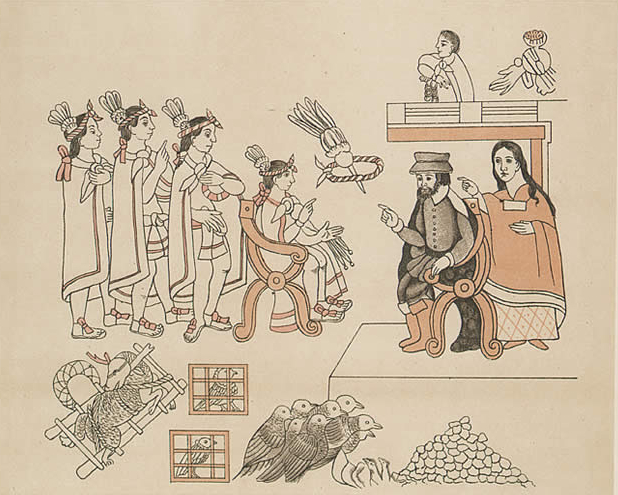
Hernán Cortés and La Malinche meet Moctezuma II in Tenochtitlan, Lienzo de Tlaxcala
As we can see in these three cases, the motive behind what we call "betrayal" is a practical, utilitarian one. In the case of Judas Iscariot, a religious leader is betrayed, in the case of Delilah, she betrays her loved one, and La Malinche "betrayed" the aztecs in order to save herself and her tribe from the brutal carnage submitted by the Aztecs.
For practical and merely illustrative purposes, I will not analyze the motives behind each case, I only pretend to point out that in all three cases, betrayal is a matter of opportunity.
Jane Austen's "Sense and Sensibility" and betrayal
My wife loves Jane Austen's books, we keep in our library a copy of her full works and in my spare time I took it upon myself to read Sense and Sensibility and found in that work excellent examples of trust and betrayal because the author needed complexity for the narrative arcs of her characters and the subtlety in human relationships. Austen perfectly understood that violations of trust come in different shades and forms.
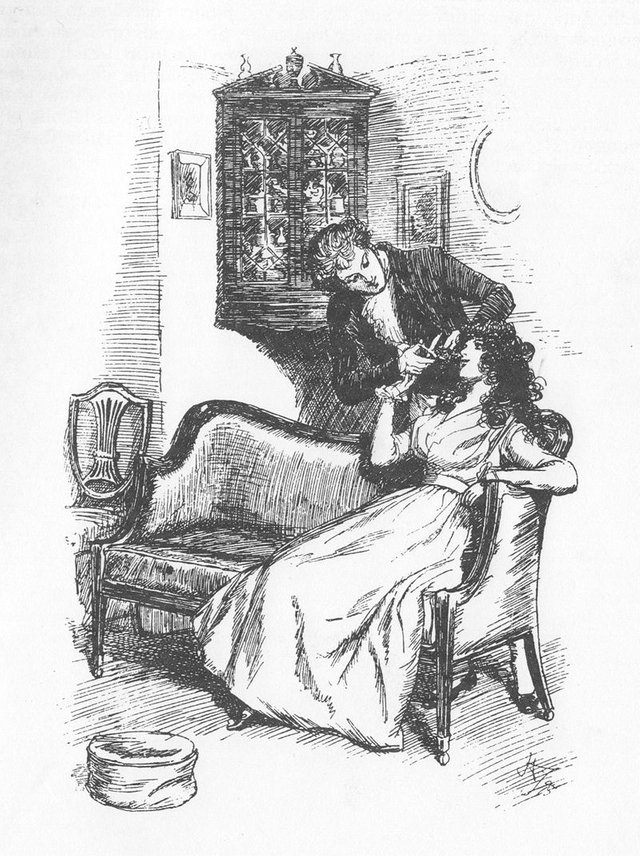
19th century illustration by Hugh Thomson showing Willoughby cutting a lock of Marianne's hair
Disappointment is a constant subject in Sense and Sensibility because deceit, neglect, and even moral culpability are on the table in the complex characters that Austen defined:
-When Mrs. Dashwood trusts Mr. Dashwood to provide for her and their daughters, she expects that the latter would honor his word.
-Colonel Brandon is trusted by Elinor with Marianne's happiness in Marriage.
-Marianne trusts Willoughby with her future happiness in marriage.
When Mr. Dashwood dies, the women are kicked our of Norland Park estate and obliged to accept the fact that they must live now under the charity of a relative of Mrs. Dashwood.
Willoughby is incapable of making Marianne happy albeit she trusted him. Marianne had based her judgment of Willoughby’s potential as a good husband solely on the grounds that he was diligent in feeding his horses, Marianne believes that Willoughby possesses all the traits of Colonel Brandon, but this doesn't make Marianne foolish, trust is warranted, not justified for the purpose of Austen's work, and warranted trust is concerned with the actual state of affairs. To justify trust and explain it makes us go into the depths of epistemological status with what constitutes adequate grounds for trusting.
We want to those who trust us to remember that we are reliable.
We may be disappointed even though we have done all we could to care for the object of trust.
When Mr. Dashwood learned that his uncle willed the family fortune so that it was impossible for him to leave either the estate or any money to the women, he was severely disappointed, but that didn't stop him from trying to follow through on his trust. He tried to improve the inheritance, but the disease got the best of him, and yet he still tried. On his deathbed he made his son promise to help his stepmother and half-sisters.
What Mr. Dashwood failed to see was that he had a greedy daughter-in-law who dissuaded his son from giving anything to the women. The lack of foresight by Mr. Dashwood results in his wife's and daughter's severe disappointment, in their eyes, he was the betrayer. (For more on Jane Austen click here)
The Vichy Regime
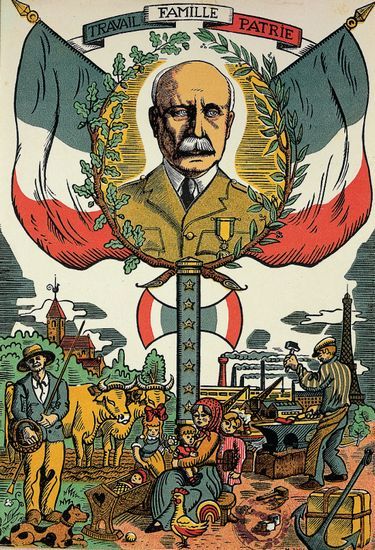
Betrayal in films
Perhaps the most iconic example of betrayal ever depicted on film because of it's intricate complexity, dramatic outcome and moral questions that we can ever see is the one with Fredo Corleone in Francis Ford Coppola's adaptation of Mario Puzo's novel "The Godfather".
Fredo ecopasses every motive why a betrayer exists, he is proud, clumsy, careless and stupid. The main traits of a betrayer.
Across the saga, Fredo betrays his family thrice.

The second act of betrayal by Fredo Corleone against his family takes place when in a dispute between Michael Corleone and Moe Greene, Fredo takes the latter's side.

The worst betrayal Fredo commits, the most despicable act of treason, and the one that eventually gets him killed, was selling information about his brother to a jewish mobster called Hyman Roth, who uses said intelligence to take a hit on Michael and his wife live's.
Michael realizes that Fredo had betrayed him after Fredo clumsily admits to another person in a night club in Havana that he knows Hyman Roth. When Michael confronts Fredo, he explains the reason of his betrayal, he was the second brother, when Sonny Corleone died, tradition stated that it was Fredo's turn to take the place as leader of the family, but his father chose Michael instead of him. For Fredo, that was dishonorable, and that was the reason for his betrayal, and his demise.
Fredo Corleone's motives illustrate in the most precise way the reasons why a person betrays.
For one part, betrayal is the result of pride. The betrayer thinks he is smarter, more capable and can outwit the one he's betraying. That's the reason why betrayal oftentimes goes hand in hand with deceit.
The betrayer expects to keep and preserve every privilege that an alliance gives him without having to give his fidelity in exchange.
The way for the betrayer to solve this is through means of deceit: He hides the other one his true intentions in other to keep enjoying the benefits of the alliance. At the same time, the betrayer thinks that if he's discovered, the other party will stick to the original deal and his betrayal won't have consequences.
Another reason why betrayers like Fredo, tend to deceit, is out of cowardice. Fredo was dealing with two families, his own and Hyman Roth's (with Moe Greene as a middleman).
Fredo Corleone thought that to deny information to Roth would have worse consequences than to be discovered by his brother. He thought that Michael would forgive him, and would be less inclined to kill him, and earning Roth's scorn would deem worse for him.
The final component of the psyche of the betrayer is stupidity. Betrayers have usually a short-foresight. Even if you lack every sense of virtue, honor and goodwill, even if your moral capacity isn't enough to think about these things and you only deal in practical transactions, it is evident for everyone that a good alliance is far better than thirty pieces of silver because an alliance can last you a lifetime.
To belong to the Corleone family is far more important that to gain some good graces with a jewish mobster like Hyman Roth.
Betrayal in Politics

There are some few examples where motivation behind betrayal is a positive one, we already examined La Malinche earlier, but let's take a look at Marcus Julius Brutus and Julius Caesar.
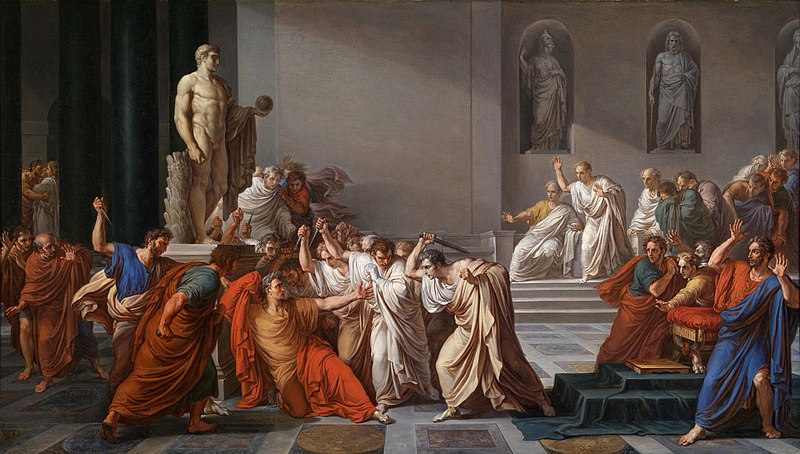
The Assassination of Julius Caesar by Vincenzo Camuccini
Before the Roman Empire came to be, Rome was a Republic, and it's principles were the basis for every other Republic ever founded. It was conformed by a Senate, there was separation of powers, balance between forces and government was decentralized.
By the end of the Republic, Brutus sided with the Senate against the first Triumvirate that took place between Crassus, Pompey, and Caesar, because Pompey had murdered his own father.
When civil war broke out in Rome between Pompey and Caesar, Brutus sided with his old enemy, Pompey against Caesar. After the Battle of Pharsalus, Brutus asked for clemency and Caesar granted his wish, took him under his wing and became good friends with him. Caesar named Brutus Governor of Galia and nominated him to be a Praetor.
In the following years Julius Caesar sought out to centralize the government around himself and managed to get appointed as a perpetual dictator. Brutus had always been a wholehearted republican, and felt that Caesar only needed a crown to be just like any other king. Brutus didn't care for monarchies and was reluctant to go back to a monarchy. So instead of reaching out to Julius Caesar with his concerns, he conspired against him within the Senate to assassinate him.
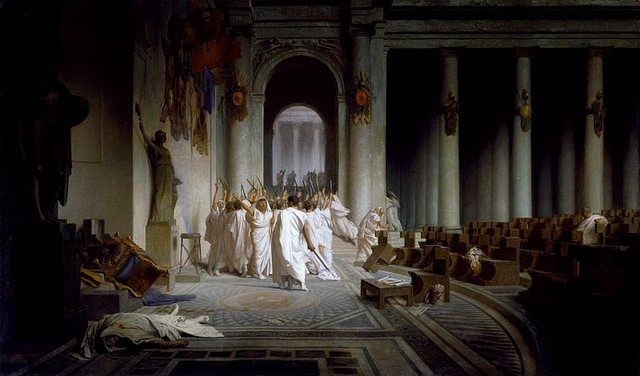
Jean-Léon Gérôme- The Death of Caesar, 1859-1867
Led by Brutus, a group of Senators stabbed Caesar to death in the Theatre of Pompey. It was done to protect the Republic, and the murderers later took the name of Libertarores ("liberators"). In spite of the fact that Caesar and Brutus were good friends and that Caesar pardoned Brutus' life, gave him power and wealth, Brutus ends up killing him.
After his death, the Republic sank in a series of bloody civil wars that precipitated the formation of the Roman Empire in a paradoxical twist.
Brutus, like Fredo, was a betrayer in more than one occasion, not only did he betray Caesar, he betrayed the memory of his father by siding with Pompey, his murderer. The fact is this, despite Brutus' motives to preserve the Republic, which are more noble than Fredo Corleone's intentions to take over the family business, or the case of Benedict Arnold, La Malinche or Delilah, he isn't any less of a traitor. Brutus allied himself with the Roman Senate to murder his protector and friend, and managed to do so by deceit.
The betrayer's common ground
Every betrayer, regardless of his motives or the way in which he managed to betray has a common ground. This common ground isn't the breach of trust, nor the breaking of an alliance, nor deceit, nor the nature of compensation. It isn't motivation, nor the feeling.
The one thing that every betrayer has in common with another is that they all violate the border, the boundaries of "us and them".
The essence of betrayal
Human beings have a dual nature. We seek our own benefit and we seek to join our will with others so that we can can achieve things that we couldn't manage to do on our own.
Our capacity to work as a group and to work alone has made us thrive and prosper. A lonely man is a weak man. In order to survive he had to join other men to form clans, and tribes that would later become towns, cities, and empires.
The most important projects of mankind are the result of collective will.
The great Cathedral of Burgos in Spain wasn't built by a single stonemason.
As a consequence, we've developed a moran dimension to guide ourselves and rule out our belonging to these different sorts of groups. That's why we value loyalty. In the past, if you left a tribe for another, that created discomfort within the societal structures and you could end up killed. Mankind evolved to despise treason.
Outside the Western mindset and culture, morality varies from culture to culture, nevertheless there are several subjects that repeat themselves. Each culture has its own attitude towards loyalty and treason and they are innate, universal and shared by almost every single culture around the world.
The moral aspects and dimension of betrayal and loyalty isn't shared by everyone. Some people feel repulsed by the traitor itself, but they are able to identify it because they describe the betrayer as someone who has violated a pact, or as someone that is being deceitful.
Right wing people are less likely to betray.
Right wingers, conservatives experiment more deeply the aspects of moral dimensions and we tend to live in environments that foster respect for high trust societies.
Leftists are innate betrayers.
This doesn't happen with leftists. Leftists only care about care and freedom from oppression. That's the reason they are so melodramatic when they feel their safe spaces are violated by a conservative. Every single policy they support is intended to repudiate conservatism, it's as though they are morally atrophied.
The left has always had a penchant for betrayal, leftists will never comprehend things such as fasting during Easter, the contempt conservatives hold for the desecration of graves or the burning of flags.
When you read, or hear progressives going on about organic, non-gmo food, recycling, global warming, veganism, or the likes, they are virtue signaling their own moral defects in an opposite way a conservative would do. They surround themselves and their morality in a halo of reason, they try to make their behavior have a scientific explanation but that's just bollocks.
It ain't science that pushes these lefties to talk about the Kyoto Protocol or Al Gore's "An Inconvenient Truth", because none of those studies is conclusive.
It ain't science that pushes these lefties to stop eating meat and then buying thousands of dollars on skincare products because they can't produce essential amino acids that make them healthy.
Leftists have their own moral rules, and that's why they will never stop in trying to subvert order, they loathe hierarchies and always organize themselves in a vertical way, although this sounds contradictory, because they morally repudiate hierarchy, they expect that a great leader will come and take them to their dream place.
Any type of group identity other than mankind is treacherous in the mindset of the leftist. Any type of loyalty you might feel towards your kith and kin, your country etc. is deemed immoral by leftists.
Progressives have a penchant to end all borders between "us and them", and this is what makes them traitors. When you say that it is important to keep, defend and define our borders, to filter out who wants to go in your country, you're accused of being insensitive.
This is the real difference between right and left wingers. The respect of the sanctity of borders. Borders that divide your property, as well as those that define your people, your sex, your community, your religion.
The left is an ever expanding movement that perpetuates itself by means of betrayal and deceit to in-group preference.
Leftists pretend that the only loyalty a man can posses is towards mankind in general. They seek to dissolve all social structures by repudiating your group, they relentlessly criticize your civilization, they will endorse mixing your race and cultures in order to eliminate any trace of something that will make you distinct from anybody else.
Progressiveness is a totalitarian ideology that won't admit dissidence, everybody should be a progressive ten times out of ten.
This is a design crafted by communism. Progressiveness is a tool to dismantle the current system. Once the system has been blown up, communism can penetrate and start doing it's bidding with society. Once evil takes root, all pre existing moral patterns are substituted by a vertical, well delimited order in which loyalty is not owed to the ones closest to you but to the party.
Progressiveness and it's inherent betrayal is a bridge for communists to get to where we are.
So never let evil take root

Congratulations! This post has been upvoted from the communal account, @minnowsupport, by beto from the Minnow Support Project. It's a witness project run by aggroed, ausbitbank, teamsteem, theprophet0, someguy123, neoxian, followbtcnews, and netuoso. The goal is to help Steemit grow by supporting Minnows. Please find us at the Peace, Abundance, and Liberty Network (PALnet) Discord Channel. It's a completely public and open space to all members of the Steemit community who voluntarily choose to be there.
If you would like to delegate to the Minnow Support Project you can do so by clicking on the following links: 50SP, 100SP, 250SP, 500SP, 1000SP, 5000SP.
Be sure to leave at least 50SP undelegated on your account.
Downvoting a post can decrease pending rewards and make it less visible. Common reasons:
Submit
Our Western countries should be getting safer but we are being betrayed by globalist politicians.
Downvoting a post can decrease pending rewards and make it less visible. Common reasons:
Submit
Because their moral dimensions are different than ours
Downvoting a post can decrease pending rewards and make it less visible. Common reasons:
Submit
Excelenteeeee
Downvoting a post can decrease pending rewards and make it less visible. Common reasons:
Submit
Congratulations @albertozambrano! You have completed some achievement on Steemit and have been rewarded with new badge(s) :
Click on any badge to view your own Board of Honor on SteemitBoard.
For more information about SteemitBoard, click here
If you no longer want to receive notifications, reply to this comment with the word
STOPDownvoting a post can decrease pending rewards and make it less visible. Common reasons:
Submit